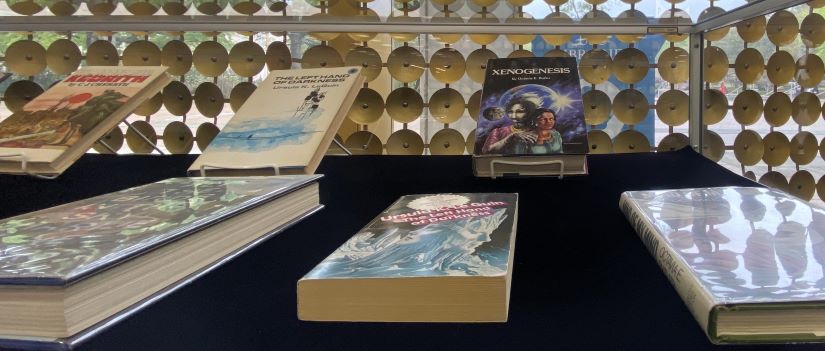“Science Fiction,” says University of South Carolina Assistant Professor of English Alyssa Collins, “asks us to take things seriously and ask questions as to what the future may look like, or how life should be.”
Historically, when we think of the voices asking those questions, they are male: Isaac Asimov, Frank Herbert, H.G. Wells and Ray Bradbury, just to name a few. But in fact, women have been writing Science Fiction since the genre’s earliest days – and, from Frankenstein to The Handmaid’s Tale, they have contributed some of its most foundational texts.
“Women in Science Fiction: From Frankenstein to Dungeons and Dragons,” an exhibit at Thomas Cooper Library curated by Rare Books Librarian David Shay, explores the rich history of female Science Fiction writers through University Libraries’ collections of works spanning from the 1600s through the present. Among the writers featured in the exhibit is renowned Science Fiction author Octavia E. Butler, whose work is especially notable for the attention it is currently attracting because of the way that novels Butler wrote decades ago reflect some of the predominant issues and concerns of our time.
During her life, Butler received the MacArthur “Genius” Grant and PEN West Lifetime Achievement Award for her work. She authored several award-winning novels tackling themes like gender, sexuality, race and the inequalities that stem from all of these. Her work ranges from more “classic” Science Fiction dystopian novels like her Earthseed duology, to more speculative and experimental fiction which can be found in the likes of Fledgling, the last of Butler’s novels published during her lifetime, which focuses on a semi-utopian vampiric society.
Like her exhibit case counterpart The Handmaid’s Tale, there has been a noticeable resurgence in popularity of Butler’s works in recent years. Several of her books have been made into television series, like Atwood’s novel. Butler was asking questions and having conversations during her lifetime that still strongly resonate with the younger generations of today, according to Collins, who is the inaugural Octavia E. Butler Fellow at the Huntington Library, where Butler’s papers are housed.
“She’s very great at extrapolating from her present day, and I think people are really drawn to it because her stories feel either prescient or like they are addressing contemporary things,” Collins says. “Especially during the COVID pandemic, people were really into the Earthseed duology.” The Earthseed duology includes Parable of the Sower and its sequel Parable of the Talents.
This is especially true when readers consider that Parable of the Sower’s story begins in 2024. Reading Parable in 2024 feels immediately eerie, as if Butler is speaking to the present day in a dystopian, semi-apocalyptic novel. Butler was incredibly good at “reading the world” according to Collins. “She called herself a ‘news junkie’ and she was very invested in research of all sorts and knowing what things were going on around her.”
The current generation of twenty-somethings is engulfed in current events, and are also having similar conversations surrounding race, gender and sexuality. Younger readers can find a kindred spirit, and recognizable voice in Butler, even though she was writing nearly thirty years ago, and died before many of them were born. “A generation who has gone on to have those kinds of conversations is finding someone who’s also having those conversations just with a time difference. Everyone caught up to Butler,” Collins says.
But Butler doesn’t tell her readers how to feel about her work, or her characters’ actions. Instead, she points readers to questions they may have about her writing and encourages them to ask these questions of their own society.
According to Collins, this is how women have been able to “shift the rules” of Science Fiction. The genre is wrought with expectations of its authors, and women writers like Butler, N. K. Jemisin and Margaret Atwood ask their readers to “look at things that are important” according to Collins. “They ask us to look at life and start to ask our own questions about it.” This, according to Collins, is the most exciting part of reading women in Science Fiction.
“A lot of Butler’s work is so powerful, but she also doesn’t tell you how you are supposed to feel about character’s actions. It’s a little ambiguous and I think she really uses those conventions.” Female Science Fiction authors like Butler take the unconventional medium, whether it be dystopian society, vampires or aliens, and gives them to readers in a way that they might have never been paid much attention to before or that they were never expecting.
"’Everything’s too crazy.’ ‘And what? You think it’s going to get sane? It’s never been sane. You just have to go ahead and live, no matter what.’” (Octavia Butler, Parable of the Sower)
This is the crux of why Butler resonates with the generation of young people entering adulthood. They ask themselves these questions every day, and in Butler they find a confidant and guiding voice.
“Women in Science Fiction: From Frankenstein to Dungeons and Dragons” is on display in the exhibit space by the front entrance to Thomas Cooper Library through the end of the Spring 2024 semester.
